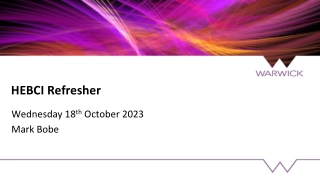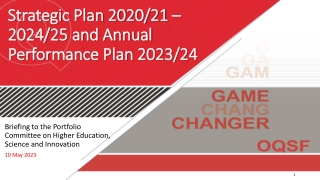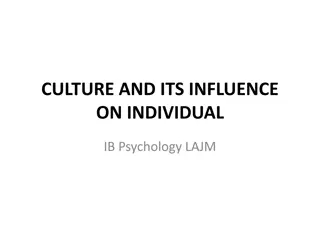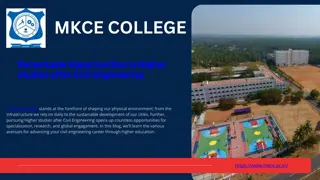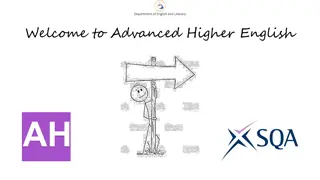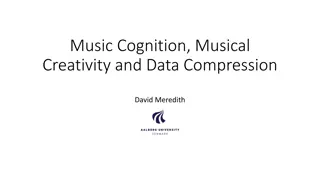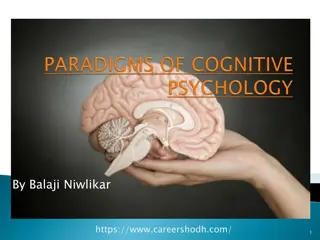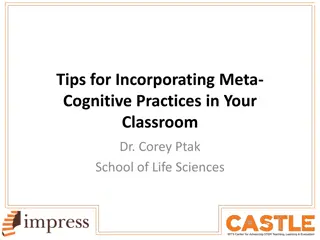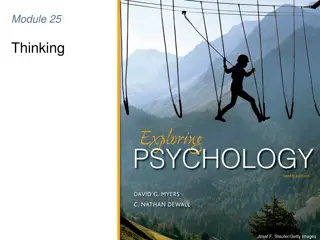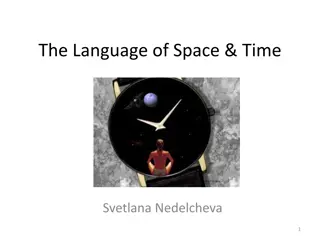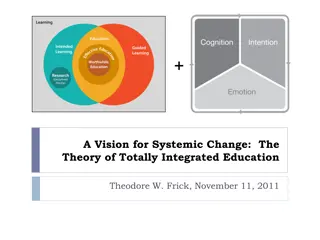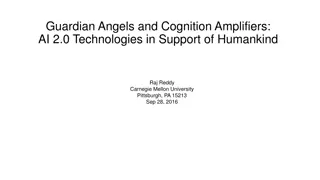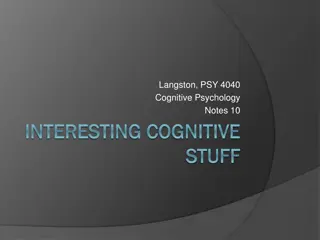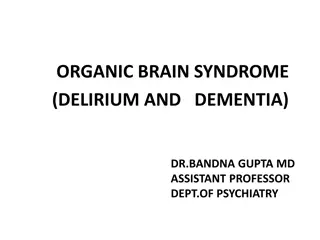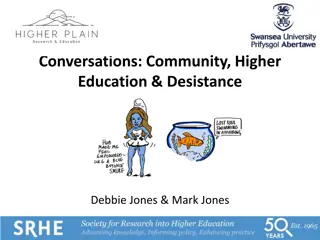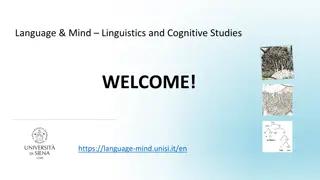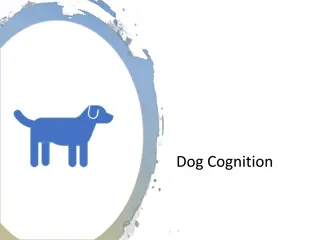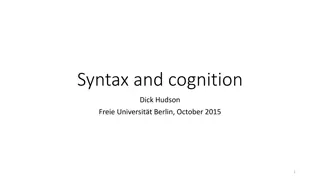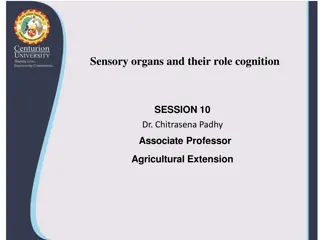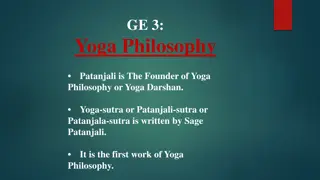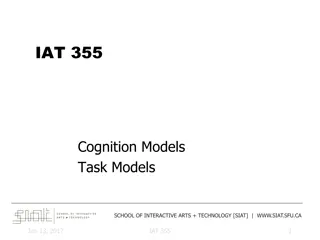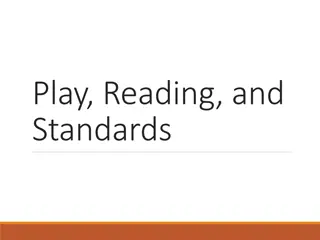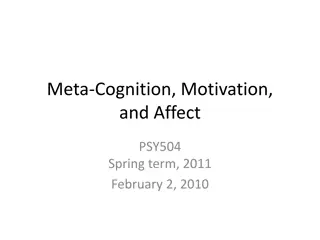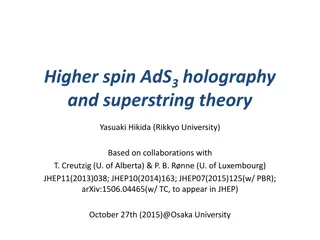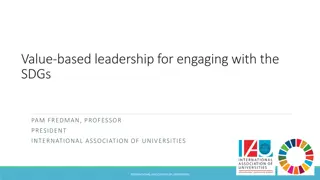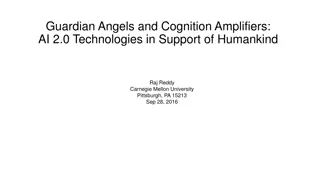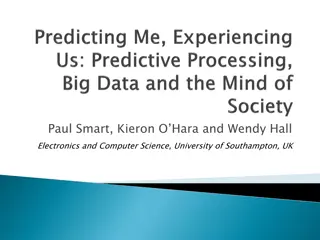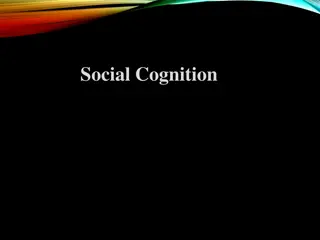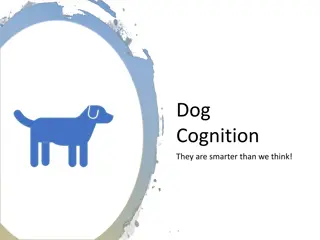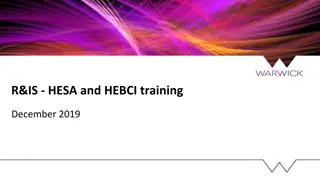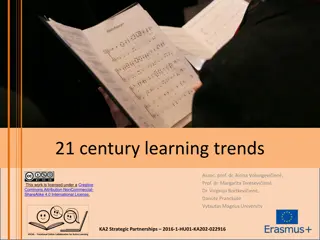Overview of Council on Higher Education's 25th Anniversary Report
Explore the rich history and future trajectories of the Council on Higher Education (CHE) in its 25th anniversary year. Delve into CHE's advisory and quality assurance roles, mandate from the Higher Education Act, and contributions to the National Qualifications Framework Act. Learn about CHE's achi
1 views • 41 slides
Presentation to the Portfolio Committee
Overview of the state of governance in the higher education sector, including key roles, institutional statutes, and the composition of councils. Highlights include the regulations under the Higher Education Act and the publication dates of institutional statutes for various universities. Emphasis i
2 views • 83 slides
HEBCI Refresher
The Higher Education-Business and Community Interaction (HE-BCI) survey aims to provide data on the ongoing collaboration between higher education providers and businesses/community, support public funding for knowledge exchange activities, offer benchmarking information, and inform funding decision
2 views • 15 slides
Understanding CAS Standards and Quality Assurance in Higher Education
Explore the Council for the Advancement of Standards in Higher Education (CAS) and its impact on quality assurance in higher education. Learn about CAS functional areas, professionalism criteria, and how CAS standards are used for program assessment. Gain insights into the vision and mission of CAS
4 views • 64 slides
The Portfolio Committee Briefing on Higher Education Strategy Plans
The briefing document outlines the Strategic Plan for 2020/21, 2024/25, and the Annual Performance Plan for 2023/24 in the field of Higher Education, Science, and Innovation. It provides an in-depth look at the objectives, goals, and performance targets set for the upcoming years, offering insight i
2 views • 55 slides
Funding Requirements for Higher Education Improvement Projects
The content outlines the restrictions and regulations related to the release of capital funds for planning and improvement of higher education facilities from the Higher Education Improvement Fund. It highlights conditions under which funds may be released, including ownership or long-term lease agr
1 views • 6 slides
Understanding the Impact of Culture on Behavior and Cognition in IB Psychology
Explore the diverse facets of culture's influence on individual behavior and cognition in IB Psychology through topics like cultural origins, norms, and Hofstede's dimensions. Dive into mind mapping, textbook comparisons, and research studies to grasp the profound effects of culture on human psychol
2 views • 41 slides
Remarkable Opportunities in Higher studies after Civil Engineering
Higher studies after Civil Engineering in Tamil Nadu\nCivil engineering stands at the forefront of shaping our physical environment; from the infrastructure we rely on daily to the sustainable development of our cities. Further, pursuing Higher studies after Civil Engineering opens up countless oppo
0 views • 2 slides
Advanced Higher English: Transition and Expectations
Moving from Higher to Advanced Higher English requires a deeper level of literary knowledge and independent critical reading and writing skills. The Advanced Higher English course involves creating a portfolio with creative and discursive writing pieces, as well as a dissertation focusing on literat
0 views • 6 slides
The Relationship Between Music, Cognition, and Data Compression
Music composition involves creating novel music for specific audiences. When we listen to music, our brain processes sound data through compression, seeking patterns and relationships to understand and appreciate the music better. This cognitive process is crucial for perception, cognition, and crea
0 views • 12 slides
Exploring Paradigms of Cognitive Psychology
Cognitive psychology, a branch of psychology, delves into mental processes like thinking, perceiving, remembering, and learning. This field views individuals as information processors, with paradigms guiding research methodologies. Key approaches include Information Processing, Connectionist, Evolut
0 views • 18 slides
Investments in African Higher Education: A 20-Year Journey
Andrea Johnson, as Program Officer for Higher Education and Research in Africa, highlights two decades of investment in African higher education. The initiatives include partnerships between universities, scholarships for women in STEM fields, and support for ICT advancements. The Partnership for Hi
5 views • 17 slides
Automatic Recognition of Higher Education Qualifications Treaty Summary
Importance of automatic recognition of qualifications in higher education has been emphasized, leading to initiatives like the Treaty on Automatic Recognition of Higher Education Qualifications by Baltic and Benelux states. This treaty aims to enhance mutual trust, transparent recognition, and contr
1 views • 8 slides
Enhancing Learning Through Metacognitive Practices
Explore the significance of metacognition in education, including understanding metacognitive processes, knowledge of cognition, regulation of cognition, benefits for students, importance of self-reflection, and exercises that promote metacognition such as retrospectives and exam wrappers. Discover
0 views • 13 slides
Understanding Cognition and Decision Making
Cognition encompasses mental activities like thinking, knowing, and remembering, while concepts simplify thinking by grouping similar objects. Cognitive strategies and obstacles in problem-solving, such as algorithms and confirmation bias, also play a crucial role. The "Aha!" moment reflects sudden
0 views • 15 slides
Exploring the Embodied Nature of Human Cognition
Exploring the concept of embodied cognition, this content delves into how human perception and understanding are shaped by physical experiences and interactions with the world. From spatial scenes to the containment concept, it highlights the fundamental role of the body in shaping our cognitive pro
0 views • 37 slides
Enhancing Education Through Totally Integrated Approach
Theodore W. Frick's Theory of Totally Integrated Education (TIE) emphasizes aligning student cognition, intention, and emotion with authentic learning tasks to create worthwhile education. TIE focuses on systemic change in education and provides a vision for improving learning outcomes by connecting
0 views • 55 slides
Understanding Public Goods in Higher Education
This text delves into the concept of public goods in higher education, examining the distinctions between public and private forms, the economic and political dimensions, and the normative value of public goods. It discusses the economic definition of public goods, emphasizing their non-rivalrous an
1 views • 18 slides
Guardian Angels and Cognition Amplifiers: Enhancing Human Intelligence with AI 2.0 Technologies
Harnessing the power of AI 2.0 technologies, Guardian Angels and Cognition Amplifiers (Gats and Cogs) augment human intelligence by continuously monitoring user activity patterns and intentions through smartphone sensors. These tools enable automation of daily activities, personalized assistance, an
0 views • 27 slides
Neuromorphic Computing: Bridging the Gap Between Silicon and Human Cognition
This research delves into neuromorphic computing, a cutting-edge field that merges principles from biology and silicon technology to advance cognitive processing. The study explores top-down approaches, drawing inspiration from the auditory cortex for DNS, and bottom-up strategies to enhance CPU arc
0 views • 17 slides
Insights on Higher Education and Latinos in California - March 2018
This data analysis focuses on higher education trends among Latinos in California, highlighting factors such as intention of higher education, family history, and awareness of education options. It reveals that over 40% of Hispanic intenders are the first generation in their family to enroll in high
0 views • 31 slides
Exploring Higher Cognitive Processes in Cognitive Psychology
Moving into higher cognition, the study delves into five key areas: categorization, language structure, language meaning, reasoning/decision making, and human factors. It also discusses memory aspects like counting-out rhymes, emphasizing the significance of oral tradition in memory transmission thr
0 views • 41 slides
Understanding Organic Brain Syndrome & Delirium
Overview of organic brain syndrome and delirium, including definitions, clinical features, and management. Delirium, a common psychiatric syndrome, affects consciousness, cognition, and perception, leading to increased morbidity and mortality. Recognize core symptoms, such as disturbances in conscio
0 views • 37 slides
Exploring Higher Education as a Tool for Desistance
This research delves into the potential of higher education in supporting desistance from offending behavior and cultivating new identities. It focuses on aspirations, barriers, and support needed for individuals with criminal convictions to engage with higher education outside of the prison environ
0 views • 14 slides
Master in Language and Mind: Interdisciplinary MA Program at University of Siena
The Master in Language and Mind is an interdisciplinary program focusing on language as a human cognitive capacity, offering two curricula in Linguistics and Cognition and Philosophy and Cognition, with opportunities for double degree programs and collaborations with international universities.
0 views • 21 slides
Dog Cognition: Understanding the Advanced Cognitive Abilities of Dogs
Exploring the fascinating realm of dog cognition reveals how dogs exhibit advanced cognitive abilities beyond that of many non-human primates. From social learning to strong discrimination learning, contingency reversal, and object manipulation, dogs showcase remarkable intelligence that continues t
0 views • 35 slides
Evolution of Syntactic Theory: From Psychology to Cognition
Syntactic theory has evolved significantly, influenced by psychology and cognition. The debate between phrase structure and dependency structure continues, with a shift towards integrating cognitive principles. Cognitive linguistics, including Cognitive Grammar and Construction Grammar, play a key r
0 views • 31 slides
Understanding the Role of Sensory Organs in Cognition
Leonardo da Vinci emphasized the significance of the five senses in experiencing life fully. Our sensory organs - sight, smell, hearing, touch, and taste - play vital roles in transmitting information to the brain for interpretation. Each sense has distinct functions essential for perceiving and und
0 views • 9 slides
Understanding Yoga Philosophy: Insights from Patanjali's Yoga Sutra
Yoga philosophy, founded by Sage Patanjali, explores the union of mind and body through practices like Viveka and Cittavritti. The Yoga Sutra delves into stopping mental modifications and identifies five types of Cittavrittis. These include Pramana (valid knowledge), Viparyaya (false cognition), Vik
0 views • 26 slides
Cognition Models in InfoVis: Understanding Knowledge Creation Process
Visualization plays a key role in aiding cognition by supporting knowledge creation and seeking tasks through process models and task taxonomies. Understanding the cognitive aspects of information visualization is crucial for aiding comprehension and knowledge understanding, as demonstrated by the u
0 views • 41 slides
Early Learning Guidelines for Language, Literacy, and Cognition
Explore the developmental milestones in language, literacy, and cognition for children ages 0 to 5 through various standards and guidelines, including WA Early Learning Guidelines, Teaching Strategies Gold, Common Core State Standards, and more. Encourage play, storytelling, writing, and communicati
0 views • 6 slides
Enhancing Understanding of Meta-Cognition, Motivation, and Affect in Psychology Classes
The content discusses survey responses and feedback on a psychology class focused on meta-cognition, motivation, and affect. Students shared insights on the best and worst parts of the discussions, highlighting the importance of staying on topic. The format of lectures followed by discussions was al
0 views • 53 slides
Exploring Higher Spin AdS3 Holography and Superstring Theory
Delve into the fascinating world of higher spin gauge theory, Vasiliev theory, and their applications in AdS/CFT correspondence. Discover the complexity and tractability of higher spin states in superstring theory, as well as the concrete relations between superstrings and higher spin fields in AdS
0 views • 27 slides
Value-Based Leadership for Engaging with the SDGs by Pam Fredman
Pam Fredman, President of the International Association of Universities, emphasizes the significance of value-based leadership in engaging with the Sustainable Development Goals (SDGs). The IAU, established in 1950 by UNESCO, aims to build a global higher education community focusing on internationa
0 views • 20 slides
Guardian Angels and Cognition Amplifiers: Transforming Human Intelligence with AI 2.0 Technologies
This explores the integration of AI technologies to enhance human cognition through the creation of personalized Guardian Angels (Gats) and Cognition Amplifiers (Cogs). These tools leverage multimodal sensors on smartphones to monitor activities, infer intentions, and automate daily tasks. The syste
0 views • 27 slides
Understanding the Brain's Predictive Processing and Cognitive Architecture
Exploring the fascinating realm of brain function and cognition, this content delves into topics like deep learning systems, big data implications, the predictive nature of the brain, cortical hierarchy, active inference, generative models, and cognitive architectures explaining various mental condi
0 views • 21 slides
Understanding Social Cognition and Schemas
Social cognition explores how people perceive and interpret social information, using automatic and controlled thinking processes. Schemas are mental structures that help us organize knowledge about the social world, affecting how we remember, interpret, and act upon information. The self-confirming
0 views • 23 slides
Unveiling the Intelligence of Dogs: A Closer Look at Dog Cognition
Dogs possess remarkable cognitive abilities that surpass common beliefs. With a strong capacity for social and nonsocial learning, discrimination, contingency reversal, object permanence, categorization, and inferential learning, dogs exhibit behaviors indicative of advanced cognitive-emotional capa
0 views • 35 slides
Understanding HESA, Research Grants, and Funding Sources in Higher Education
HESA (Higher Education Statistics Agency) plays a crucial role in collecting, assuring, and disseminating data in higher education. This includes reporting on research grants, contracts, and the Frascati definition of research. The allocation of research income from various sources such as Research
1 views • 24 slides
Emerging Trends in 21st Century Learning Pedagogies
Higher education faces the challenge of adapting to a changing world at the turn of the 21st century. Innovative learning pedagogies such as distributed cognition, personalization, openness, student-generated content, and interactive learning are key in preparing institutions for future competitiven
0 views • 21 slides


